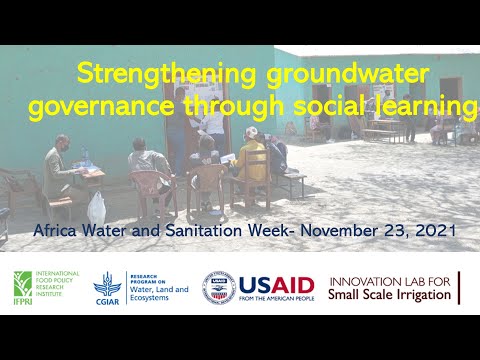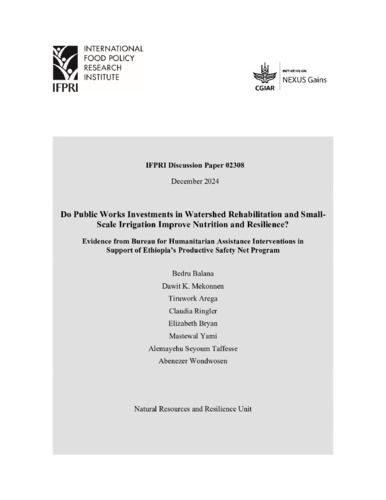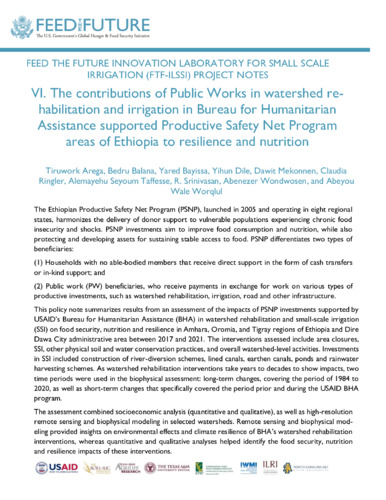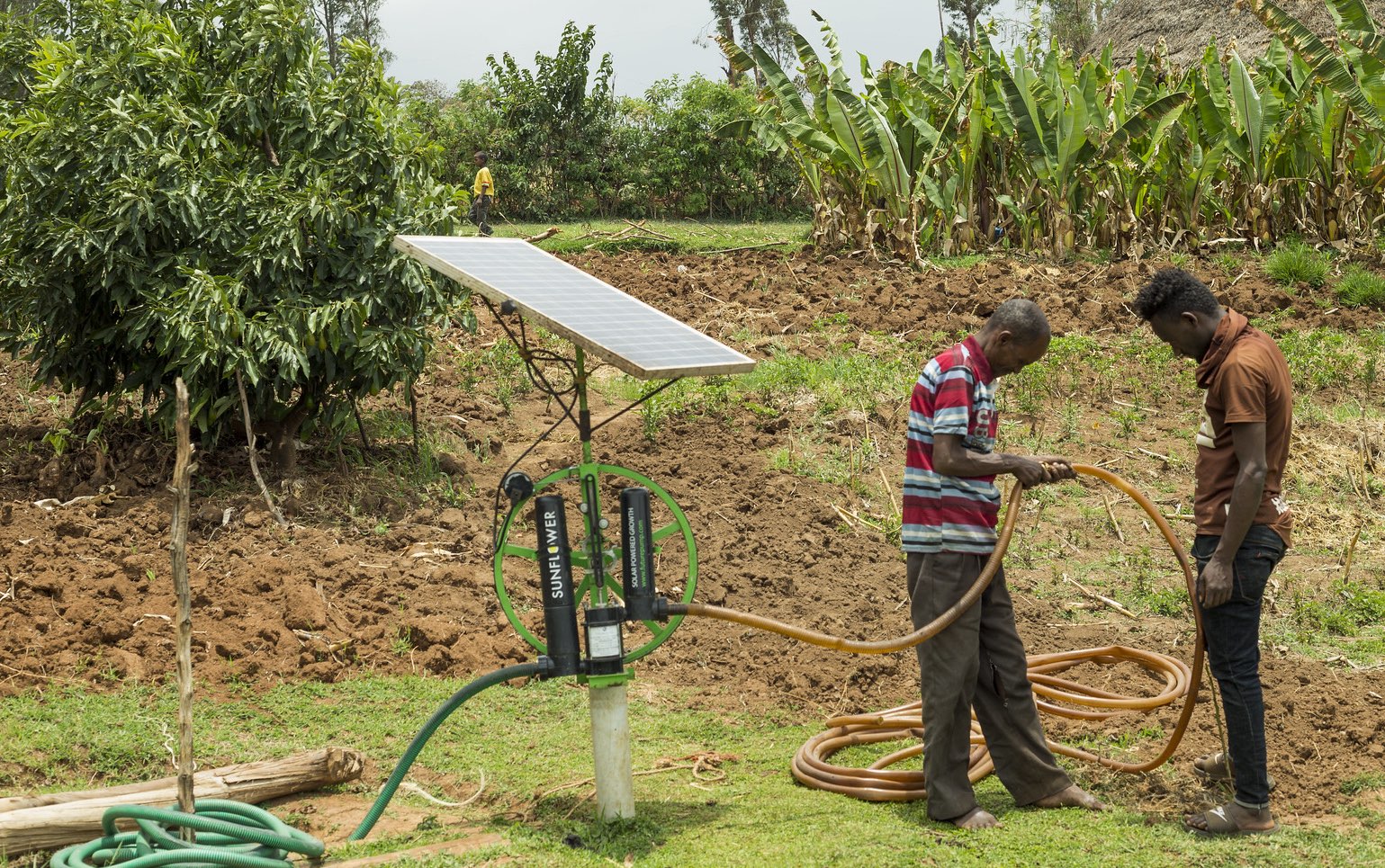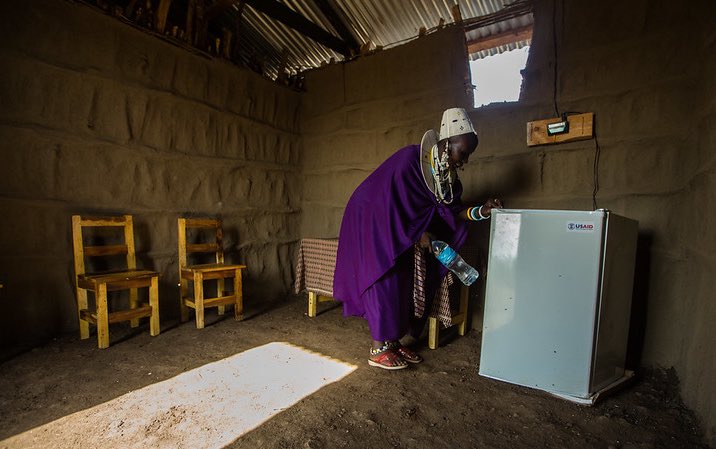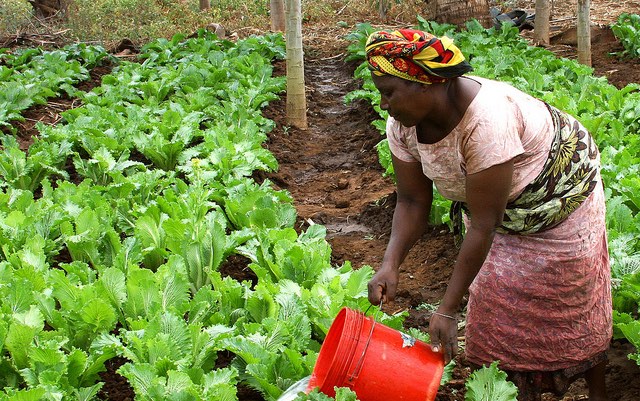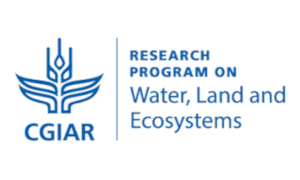The contributions of Public Works in watershed rehabilitation and irrigation in Bureau for Humanitarian Assistance supported Productive Safety Net Program areas of Ethiopia to resilience and nutrition
The Ethiopian Productive Safety Net Program (PSNP), launched in 2005 and operating in eight regional states, harmonizes the delivery of donor support to vulnerable populations experiencing chronic food insecurity and shocks. PSNP investments aim to improve food consumption and nutrition, while also protecting and developing assets for sustaining stable access to food. PSNP differentiates two types of beneficiaries: (1) Households with no able-bodied members that receive direct support in the form of cash transfers or in-kind support; and (2) Public work (PW) beneficiaries, who receive payments in exchange for work on various types of productive investments, such as watershed rehabilitation, irrigation, road and other infrastructure. This policy note summarizes results from an assessment of the impacts of PSNP investments supported by USAID’s Bureau for Humanitarian Assistance (BHA) in watershed rehabilitation and small-scale irrigation (SSI) on food security, nutrition and resilience in Amhara, Oromia, and Tigray regions of Ethiopia and Dire Dawa City administrative area between 2017 and 2021. The interventions assessed include area closures, SSI, other physical soil and water conservation practices, and overall watershed-level activities. Investments in SSI included construction of river-diversion schemes, lined canals, earthen canals, ponds and rainwater harvesting schemes. As watershed rehabilitation interventions take years to decades to show impacts, two time periods were used in the biophysical assessment: long-term changes, covering the period of 1984 to 2020, as well as short-term changes that specifically covered the period prior and during the USAID BHA program. The assessment combined socioeconomic analysis (quantitative and qualitative), as well as high-resolution remote sensing and biophysical modeling in selected watersheds. Remote sensing and biophysical mod eling provided insights on environmental effects and climate resilience of BHA’s watershed rehabilitation interventions, whereas quantitative and qualitative analyses helped identify the food security, nutrition and resilience impacts of these interventions. Of note, the assessment was undertaken during the COVID-19 pandemic and was also substantially affected by civil conflicts in the northern part of the country. This affected both the study design and data access and the implementation of the BHA-supported PSNP PW investments. The results should be seen in this context.
Authors
Arega, Tiruwork; Balana, Bedru; Bayissa, Yared; Dile, Yihun T.; Mekonnen, Dawit Kelemework; Ringler, Claudia; Taffesse, Alemayehu Seyoum; Srinivasa, R.; Wondwosen, Abenezer; Worqlul, Abeyou Wale
Citation
Arega, Tiruwork; Balana, Bedru; Bayissa, Yared; Dile, Yihun; Mekonnen, Dawit Kelemework; Ringler, Claudia; et al. 2024. The contributions of Public Works in watershed rehabilitation and irrigation in Bureau for Humanitarian Assistance supported Productive Safety Net Program areas of Ethiopia to resilience and nutrition. Feed the Future Innovation Lab for Small Scale Irrigation (FTF-ILSSI) Project Notes 6. Washington, DC: International Food Policy Research Institute (IFPRI). https://doi.org/10.2499/p15738coll2.137067.
Keywords
Eastern Africa; Sub-saharan Africa; Africa; Shock; Investment; Sustainability; Nutrition; Watershed Management; Irrigation; Infrastructure; Food Security; Cash Transfers
Access/Licence
Open Access




